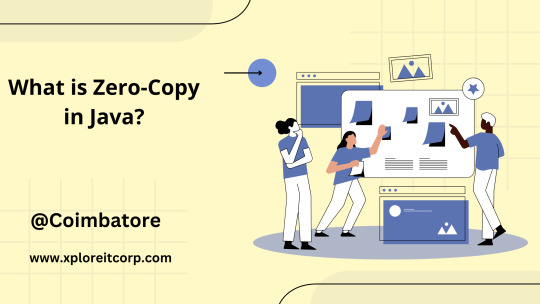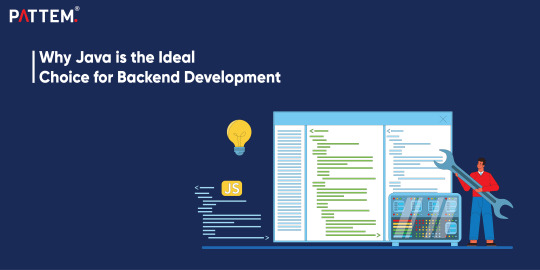#Java Backend Development
Explore tagged Tumblr posts
Text
What is Zero-Copy in Java?

Zero-Copy is a technique that allows data to move between storage and network devices without needing to copy it into the application layer. In traditional I/O methods, you deal with several context switches and memory copies, but Zero-Copy cuts down on that, making things faster. This approach is super helpful for high-performance applications like file servers or video streaming services.
How Zero-Copy Works Internally
To get a grip on Zero-Copy in Java, you need to understand how the Java NIO (New Input/Output) package operates. It lets data flow straight from a file channel to a socket channel through methods like transferTo() and transferFrom(). This avoids using the Java heap and saves CPU cycles, which is really useful for anyone taking a Java Full Stack Developer training Course in Coimbatore .
Benefits of Using Zero-Copy
Some of the main benefits are less CPU usage, reduced latency, and better throughput. When applications need to transfer large files, they can do it more smoothly. This is especially relevant in enterprise-level development, which is a big part of the Java Full Stack Developer Course in Coimbatore. Developers learn how to improve server-client communication using features like Zero-Copy.
Use Cases in the Real World
Zero-Copy is popular in web servers, file servers, and video streaming platforms. Companies that need fast data handling tend to use this method. Students in Java Training in Coimbatore can try out Zero-Copy in lab sessions or projects related to file transfers and socket programming.
Zero-Copy vs Traditional I/O
With traditional I/O, data gets copied several times—from disk to kernel buffer, then to user space, and finally to the socket buffer. Zero-Copy skips these extra steps. Understanding this difference is key for anyone learning about performance optimization in server-side apps.
Java NIO and Its Importance
Java NIO was introduced to support scalable and non-blocking I/O tasks. It gives you the tools to implement Zero-Copy. In a Java Course in Coimbatore, you'll learn how NIO helps create fast and efficient applications, an important skill in the Java world.
Challenges and Limitations
Even though Zero-Copy enhances performance, it’s not the best choice for every situation. It's mainly useful for large file transfers rather than small bits of data. Also, debugging can get tricky because there’s less access at the application level. Students in the Java Full Stack Developer Course learn how to wisely decide when to use Zero-Copy.
Industry Demand and Career Impact
Knowing about Zero-Copy in Java can help a developer stand out, especially in roles that require high-performance application development. Many tech companies are on the lookout for skills in this area. For those in Java Training in Coimbatore, mastering these topics can lead to great job opportunities in backend and systems development.
Tools and Libraries Supporting Zero-Copy
Besides Java NIO, other frameworks like Netty also support Zero-Copy. These tools are often covered in advanced modules of a Java Course in Coimbatore. Learners can use these libraries to build scalable, high-performance applications, especially for real-time data tasks.
Conclusion: Master Zero-Copy with the Right Training
So, Zero-Copy in Java is a handy I/O method that's key for modern Java applications. To really get the hang of it, professional training is a must. Enroll in a Java Full Stack Developer Course in Coimbatore or participate in hands-on training at Xplore IT Corp, where they teach practical skills like Zero-Copy and Java NIO.
FAQs: What is Zero-Copy in Java?
1. What is Zero-Copy in Java and why is it useful?
Zero-Copy in Java allows for direct data transfer between disk and network without moving it into application memory, which boosts performance.
2. Which Java package supports Zero-Copy operations?
Java NIO supports Zero-Copy through methods like FileChannel.transferTo() and transferFrom().
3. Can I learn Zero-Copy in a Java Course in Coimbatore?
Yes, good training centers offer detailed modules on Zero-Copy, especially in full stack and advanced Java courses.
4. Is Zero-Copy suitable for all Java applications?
No, it works best for large file transfers or fast data systems where speed is important.
5. Where can I get hands-on training in Zero-Copy and Java NIO?
You can join Xplore IT Corp, recognized for its solid Java Training in Coimbatore and Java Full Stack Developer Course.
#Spring Framework in Java#Java Dependency Injection#Java Spring Boot#Spring Bean Configuration#Java Object Lifecycle#Spring ApplicationContext#Java Backend Development#Java Programming Basics#Spring Initializer#Java Class Loader
0 notes
Text
Why is Java the Ideal Choice for Backend Development?

Steering Backend Development with Java
Backend programming is also known as server-side development, which refers to the behind-the-scenes logic that boosts web applications. This back-end development includes everything that exists in the server, and they include everything from data storage and modeling to security concerns. The backend developers play an important role in ensuring that the application works smoothly, focusing on websites, back-end logic, architecture, servers, and Application Program Interfaces (APIs). Moreover, it includes functionality, which needs to be accessed and navigated by digital means. In this blog, we will answer the question of why developers prefer Java for backend processes and we will drive through the advantages of using Java backend development. So, without any further delay, let us jump into this blog!
Exploring how does Java increases the Backend Development process
Backend programming languages like Java, C#, and PHP are very adaptable to gain all certain information from the stored database when it is processed through an application. The backend receives input from the front-end and generates and sends responses to the clients. Enterprise applications need to be more difficult and secure to make sure that the data are confidential. It is the perfect choice for managing backend processes as it offers a lot of advantages and benefits. Java is the most popular and universally used programming language used for creating innovative and powerful web applications. The Java code is compiled into bytecode, and then it will be compiled by the Java compiler. JVM acts as an interpreter between the underlying hardware and the programming language, and it also provides a runtime environment for the applications to run on different OS.
Java-based applications can eventually run on any platform like iOS, Android, etc. Nowadays, most developers prefer Swift for iOS and Kotlin for Android, but a major principle is that these languages are nothing but only an advanced Java version with some similarities at the core. It is impossible to invade a Java-based application as it has a lot of in-built security features. Furthermore, Java has less ambiguous syntax terminology and enables beginners to initiate Java with basic principles. Additionally, Java is a stable and reliable programming language for developing backend applications, which makes it a popular choice for developing enterprise applications.
Java is an extensible, modular, accessible programming language that supports principles like polymorphism, encapsulation, overloading, and data abstraction. Java’s multithreading ability makes it a highly-demandable programming language in the industry. Multithreading permits developers to maximize the CPU’s usage, and it also shares memory space and boosts applications efficiency and performance. The multithreading ability prevents Java applications from performing slow and unresponsive tasks when a lot of work is needed. Moreover, it is very useful in the backend development as it effectively handles multiple tasks simultaneously. It is great for backend development, and it is very much vital in multithreading, using effective resources, boosting application performance, and it also enables developers to create ascendable and innovative backend systems to handle complex requests and data.
Closing the Blog Backend Development with Java
From this blog, we have learned about the advantages and key features of using Java in backend development. It allows developers to build a strong backend for handling all the complex data. Also, Java has an automatic garbage collector that helps developers to avoid problems like segmentation faults and memory leaks.
Choosing the best Java development services company also plays a crucial role in the company's growth. Pattem Digital is the leading Java development company that delivers the industry's best applications. We possess a young and talented team of developers to provide our clients with innovative applications and websites.
0 notes
Text
introduction. hi :)
hello!!
i wanted to document my process of learning to code :) it's something i've always been interested in, but never got to, because i felt like it would take too much time to become good. well, the time will pass anyways, i need a project to stay sane. i have adhd, so it's somewhat of a developing hyperfixation / special interest for me.
i was using sololearn to learn, before i got paywalled :/ -- now i'm using freecodecamp and will probably also use codeacademy. on freecodecamp, i'm doing the certified full stack developer program which will (from my understanding) teach me to code front-end / client side as well back-end. i knew some HTML to begin with, but so far i've finished the basics of HTML mini-course and am on to structural HTML. After the full HTML topic, the course teaches me CSS, Java, Back-End Javascript and Python.
LONG STORY SHORT!! let's be friends, because i love doing this. also i need help. and advice. so much of it. m




#codeblr#studyblr#programming#coding#web development#web developing#progblr#backend development#frontend#frontenddevelopment#html#html css#java#javascript#python#fullstackdevelopment#computer science#stem#stemblr#introduction#looking for moots#mutuals#looking for mutuals
10 notes
·
View notes
Text
youtube
#online courses#coding#graphic designing#web design#ict skills#india#hindi#gujarati#english#www.ictskills.in#online training#live training#full stack course#digital marketing#ui ux design#backend#online#live courses#courses#education#computer science#engineering#java#python#php#dot net development company#spring mvc#javascript#Youtube
2 notes
·
View notes
Text
FullStackJava: Mastering Both Ends of the Stack
Java isn't just for backend anymore! As a full stack Java developer, you'll wield powerful tools on both sides:
Frontend:
JavaServer Faces (JSF)
Thymeleaf
Vaadin
Backend:
Spring Boot
Hibernate ORM
RESTful APIs
Database:
JDBC
JPA
Build & Deploy:
Maven/Gradle
Docker
Jenkins
Embrace the versatility. Java full stack = limitless possibilities.
3 notes
·
View notes
Text

Summer Internship Program 2024
For More Details Visit Our Website - internship.learnandbuild.in
#machine learning#programming#python#linux#data science#data scientist#frontend web development#backend web development#salesforce admin#salesforce development#cloud AI with AWS#Internet of things & AI#Cyber security#Mobile App Development using flutter#data structures & algorithms#java core#python programming#summer internship program#summer internship program 2024
2 notes
·
View notes
Text
🧩 Day 11 of Java Mastery: Relational Operators Want your code to make decisions? Read Blog: https://wp.me/paNbWh-6A #Java #JavaMastery #Day11 #RelationalOperators #LearnJava #100DaysOfCode #CodeNewbie #JavaBasics #LogicBuilding
#>#>=#<#app development#architecture of java#arithmetic#backend#beginner#calculations#datastructures#execution flow#frontend#fullstack#fullstackdeveloper#greater than#greater than or equal to#Java#less than#less than or equal to#operators#output#print#relational
0 notes
Text
#software development company delhi#software development company delhi ncr#java backend developer in Delhi#application modernization software#Website Making Company in Delhi#Backend Development in Dwarka
0 notes
Text
What Is Object-Oriented Programming in Java and Why Does It Matter?

Java is super popular in the programming world, and one of the main reasons for that is its use of object-oriented programming (OOP). So, what exactly is OOP in Java, and why should you care? OOP is a way to organize your code by grouping related data and functions into objects. This makes Java easier to work with, more organized, and simpler to update.
Key Ideas Behind Object-Oriented Programming
To get a grip on OOP in Java, you need to know four main ideas: Encapsulation, Inheritance, Polymorphism, and Abstraction. These concepts help you write clean and reusable code, which is pretty important in software development today.
Encapsulation: Keeping Data Safe
Encapsulation means protecting the internal data of an object from being accessed directly. You do this using private variables and public methods. When you take a Java course in Coimbatore, you’ll learn how this helps keep your code secure and safeguards data from accidental changes.
Inheritance: Building on Existing Code
Inheritance lets a new class take on the properties of an existing class, which cuts down on code repetition and encourages reuse. Grasping this idea is key if you want to dive deeper into Java development, especially in a Java Full Stack Developer course in Coimbatore.
Polymorphism: Flexibility in Code
Polymorphism allows you to treat objects as if they are from their parent class rather than their specific class. This means you can write more flexible code that works across different cases. You’ll definitely encounter this in Java training in Coimbatore, and it’s essential for creating scalable applications.
Abstraction: Simplifying Complexity
Abstraction is all about hiding the messy details and only showing what’s necessary. For example, when you use your smartphone, you don’t need to understand how everything works inside it. Java uses abstract classes and interfaces to make things simpler, which you’ll notice in any solid Java course in Coimbatore.
Why It Matters in Real Life
So, circling back: What is OOP in Java and why is it important? Its real strength comes from making big software projects easier to manage. OOP allows multiple developers to work on their parts without stepping on each other’s toes.
OOP and Full Stack Development
Full stack developers cover both the frontend and backend. Understanding OOP in Java can make your backend logic much better. That’s why a Java Full Stack Developer Course in Coimbatore focuses on OOP right from the start.
Java and Your Career Path
If you're looking to become a software developer, getting a good handle on OOP is a must. Companies love using Java for building big applications because of its OOP focus. Joining a Java training program in Coimbatore can help you get the practical experience you need to be job-ready.
Wrapping Up: Start Your Java Journey with Xplore IT Corp
So, what is object-oriented programming in Java and why is it important? It’s a great way to create secure and reusable applications. Whether you’re interested in a Java Course in Coimbatore, a Full Stack Developer course, or overall Java training, Xplore IT Corp has programs to help you kick off your career.
FAQs
1. What are the main ideas of OOP in Java?
The key ideas are Encapsulation, Inheritance, Polymorphism, and Abstraction.
2. Why should I learn OOP in Java?
Because it’s the foundation of Java and helps you create modular and efficient code.
3. Is it tough to learn OOP for beginners?
Not really! With good guidance from a quality Java training program in Coimbatore, it becomes easy and fun.
4. Do I need to know OOP for full stack development?
Definitely! Most backend work in full stack development is based on OOP, which is covered in a Java Full Stack Developer Course in Coimbatore.
5. Where can I find good Java courses in Coimbatore?
You should check out Xplore IT Corp; they’re known for offering the best Java courses around.
#Java programming#object-oriented concepts#Java syntax#Java classes#Java objects#Java methods#Java interface#Java inheritance#Java encapsulation#Java abstraction#Java polymorphism#Java virtual machine#Java development tools#Java backend development#Java software development#Java programming basics#advanced Java programming#Java application development#Java code examples#Java programming logic
0 notes
Text
progress 2 - thur 3 april 2025
um okay so ignore that little skipping a part of my curriculum mishap. right now im working on a project in the "lab" portion of the course (where you work on your own little projects so they can test what theyve taught you). for this one, youre supposed to make a small, simple page for recipes. everything about my code registers as right except for the <meta charset=UTF-8> part. its not registering it :/ in case anyone has any advice.


help i dont know what ive done wrong.
#backend development#frontend#frontenddevelopment#html#html css#java#javascript#python#fullstackdevelopment#computer science#stem#stemblr#introduction#looking for moots#mutuals#looking for mutuals#codeblr#coding#progblr#programming#mitya-codes.txt
9 notes
·
View notes
Text
youtube
In this video, we dive deep into the battle of backend technologies: Node.js vs. Java. Watch as we explore the differences in architecture, performance, scalability, and use cases for both technologies. From real-time features and microservices with Node.js to enterprise-level reliability with Java, our Jelvix experts share insights on which technology is best suited for your next project. Plus, we’ll discuss how a hybrid approach combining both Node.js and Java could offer the perfect balance of performance and scalability. Watch now and make an informed decision for your development needs! #Java #coding #programming
#web development#java#node js#backend#backend development#programming#coding#programming languages#Youtube
1 note
·
View note
Text

🛑 Placement Assistance Program 🛑 👉 Join our JAVA & .NET Training! 📅 New Batch: 20th Feb 2025 ⏰ Time: 11:00 AM - 01:00 PM 📍 Mode: Classroom / Online ✅ What You'll Learn:
Core Java, Advanced Java, Oracle
C# .NET, ASP.NET, MVC Core
HTML | CSS | JS, Angular 15
Data Structures, Algorithms, Soft Skills, CRT
🎯 Why Join? ✔️ Expert Instructors ✔️ Hands-on Learning ✔️ Placement Assistance
👉 Register Now: https://t.ly/bN-TR 📞 Contact: +91-9000225725 | [email protected]
Follow us for more updates: 📸 Instagram: @nareshitech
#java#java.net#software#coding#programming#javaprogramming#developer#backend#java training#placement
0 notes
Text
Java Full Stack Developer Course | Land Your Dream Job
Are you looking to build a career as a Java Full Stack Developer? Our comprehensive Java Full Stack Developer Course is designed to help you master both frontend and backend technologies, making you industry-ready.

Why Choose a Java Full Stack Developer Course?
A full stack developer is skilled in handling both client-side and server-side development. With expertise in Java, databases, frameworks, and cloud technologies, you become a versatile IT professional.
What You Will Learn:
✅ Frontend Development – HTML, CSS, JavaScript, React.js/Angular ✅ Backend Development – Core Java, Spring Boot, REST APIs ✅ Database Management – MySQL, MongoDB ✅ DevOps & Deployment – Docker, Kubernetes, AWS ✅ Project-Based Learning – Real-world applications and hands-on experience
Benefits of Learning Java Full Stack Development:
High demand for full stack developers in the job market
Competitive salary and career growth opportunities
Versatility to work on different projects and technologies
Mastery of Java frameworks, APIs, and databases
Who Should Enroll?
This course is ideal for: ✔ Beginners aiming for a career in full-stack development ✔ Software professionals looking to upskill ✔ Students and freshers interested in web development
Enroll Now & Kick-start Your Java Full Stack Development Journey!
Gain hands-on experience, work on live projects, and get job-ready with our expert-led training.
#Java Full Stack Developer Course#Java Full Stack Training#Full Stack Development with Java#Java Full Stack Online Course#Learn Java Full Stack#Java Web Development Course#Best Java Full Stack Course#Java Backend and Frontend Training#Full Stack Java Developer Certification#Java Full Stack Developer Skills.
0 notes
Text
⚙️ Day 9 of Java Mastery: Understanding Operators in Java 📘 Read full blog post with examples and tips: 🔗 https://wp.me/paNbWh-5z Which operator tripped you up when learning Java? Let’s talk in the comments 👇 #Java #JavaMastery #Day9 #JavaOperators #LearnJava #100DaysOfCode #ProgrammingBasics
#app development#architecture of java#arithmetic#backend#beginner#bitwise#datastructures#execution flow#frontend#fullstack#fullstackdeveloper#Java#operators#output#print#relational#unary#variables
0 notes
Text
#dedicated backend developers#offshore backend developers#offshore backend development#hire offshore backend developers#hire offshore backend developer#java vs c#for backend#hire dedicated backend developers#hire dedicated backend developer#hire a backend developers#hire backend developers in india#hire backend developers#backend developers for hire#hire backend developer#dedicated backend developers for hire india
0 notes
